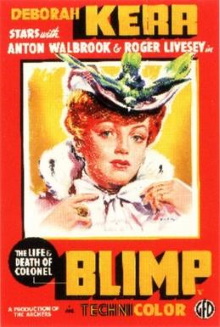I’ve watched so many films in so many languages from so many countries but rarely has one felt as alien as this one during its opening scenes with its sputtering outbursts of “War starts at midnight!” It’s the combination of the familiar with the utterly absurd of course and this is only one of many reasons why this is such a brilliant film. This has been called the greatest British film of all time and you can tell why because the central theme of the film is really Englishness itself. I understand that the character of Colonel Blimp originated in comic strips as an object of mockery but this version is actually very sympathetic and lovable.
When Major-General Clive Candy is ambushed and captured by a young officer during a training exercise, he is outraged by the lack of respect shown. A flashback recounts his life and career, beginning with distinguished service in the Boer War. While on leave, a British woman working in Germany sends him letter about nasty rumors of British war crimes in South Africa being spread in Germany. Against orders, he goes to meet the woman, Edith Hunter, and gets challenged to a duel against a German officer, Theo Kretschmar-Schuldorff. Both are injured, but while recuperating in hospital Candy becomes friends with Theo. To Candy’s surprise, Theo and Edith also fall in love with each other. Candy’s celebrates their engagement with them but only later realizes that he loves Edith as well. Years pass and Candy is promoted to Brigadier-General during the First World War. Near the end of the war he notices that among a cohort of young British nurses is one who looks exactly like Edith. After the war, he pursues and marries the woman despite being twenty years older. He also tries to visit Theo when he learns that he is in a prisoner-of-war camp but Theo ignores him until he is about to be repatriated back to Germany.
This brief outline doesn’t do justice to a two and half hour film like this and as I noted, it might not be clear for a while what it’s even trying to do. With Candy’s feelings for Edith and subsequently marrying someone who looks exactly like her, this may even seem like it’s a romantic film but it isn’t, not really. The opening title screen of a knitted tapestry with a coat of arms and a pretty countryside gives more of a clue: this is a film about Englishness itself from the perspective of a curmudgeonly man with old-fashioned notions from a bygone age. Candy is a gentleman officer of the old school who believes that right is might instead of the other way around, upholds honor, sportsmanship, and playing by the rules. Even after he duels Theo and Theo snatches away the love of his life, he maintains good cheer and becomes best friends with Theo. He extends the hand of friendship even after the First World War and together with the rest of British ruling establishment hopes to put the nasty business of the war behind them and become friends again. This not mere affectation, he firmly believes that such manners and good behavior are the solid foundations of civilization. The aged Candy may look like something of a buffoon, with his exaggerated mustaches, outraged blustering and chestful of medals, but his backstory shows how he came by all his achievements and battle scars fairly so that he does indeed deserve the respect he insists upon.
This still is propaganda of course, and it’s even war propaganda, but it comes at you from such an odd angle that I don’t mind. The picture it is trying to paint of Englishmen being virtuous gentlemen is a self-serving myth as the history of England is filled with all manner of atrocities and gross injustice. The thing is this film is adroit enough to acknowledge its own absurdity as we see Candy’s trophy room fill up with animal heads as he kills his way through Africa and Asia over the course of an illustrious career. At the same time, it’s an effective way of highlighting the horror of the Nazi regime. As Candy’s wife notes, there is something grotesque in how the Nazis can appreciate classical music just civilized people and then turn around and kill women and children. Ultimately the film wants Candy and his generation to realize that war against the Nazis can’t be fought under gentlemen rules as a Nazi victory would mean the end of all that it means to be English. Theo at first is skeptical that the English are serious about wanting to be friends after the First World War but later urges Candy not to underestimate the Nazis. This film was made during wartime after all so that is understandable even as it bemoans the passing of a supposedly more innocent era.
All of which means that the film now exemplifies Englishness, or at least some idealized version of it. As time passes, I think this effect becomes even more pronounced so Candy reminds you of a grandfather with adorably old-fashioned habits and beliefs. It’s important to keep in mind that this is an artificially constructed narrative but it does make for an insightful study of what Englishmen would like themselves to be seen as and what they think England should stand for. It also helps that this is a very entertaining and funny film as well being one of the most interesting ways that a film can be nationalistic.

One thought on “The Life and Death of Colonel Blimp (1943)”